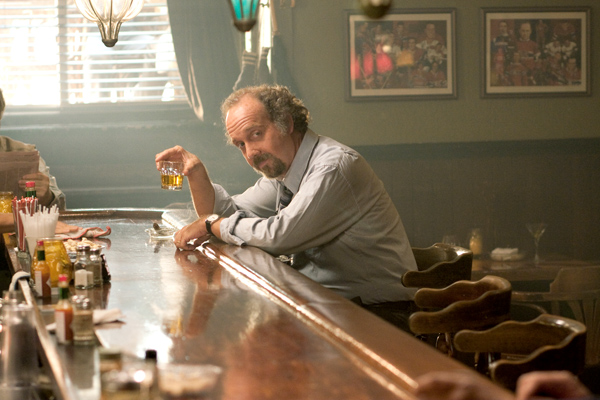|
Reviews of Recent Independent, Foreign, & Documentary Films in Theaters and DVD/Home Video

BARNEY’S VERSION Barney’s Version is the apologetic memoir of an irascible reprobate, who sees his travails through a satiric lens on the latter 20th-century Jewish Canadian cultural experience. He’s not only been through three marriages, but he may have even murdered his best friend. Chomping on cigars and swilling much booze at his favorite watering hole, the Grumpy Bar, Paul Giamatti pulls off an aging Barney Panofsky, from his youthful bohemian la dolce vita in 1970’s Rome to an old crank full of regrets. In between, Barney became wealthy as an Aaron Spelling-like TV shlockmeister, running a company called Totally Unnecessary Productions, a beneficiary of Canadian content rules. His oeuvre is hilariously represented by scenes that feature delicious cameos of Canadian talent: Paul Gross starring in episodes of the Due South-like soap opera O’ Malley of the North, directed by the moody likes of David Cronenberg and Atom Egoyan. These, and several other cameos by noted Canadian filmmakers, are a tribute to the late Mordecai Richler, from whose last novel this film is adapted. Richler is better known in the U.S. for The Apprenticeship of Duddy Kravitz, which was adapted into a Ted Kotcheff movie in 1974—an older Duddy occasionally meets up with Barney in the book, and Kotcheff makes an appearance here. Director Richard J. Lewis dealt with similar themes of aging in Whale Music (1994), and its star, the late Maury Chaykin, is also briefly seen. Barney is haunted in streams of not-always-chronological but vivid flashbacks by three men. His best friend, Bernard “Boogie” Moscovitch (Scott Speedman), was always everything he wasn’t—charming, good-looking, an effortless ladies’ man, a talented writer, and an intellectual. The devoted and envious Barney supported him, and his drug habit, for years. Barney has his own Inspector Javert in the form of an obsessed police detective, who’s convinced that Barney killed Boogie and pursues him in court and in an accusatory book. The continuing mystery of Barney’s guilt or innocence isn’t solved until the end. Barney’s blue-collar roots show through his father Izzy, and Dustin Hoffman shines as the earthy retired cop full of funny, crass stories of the tough old days in Montreal, of brothels and the brutal, anti-Semitic police force. His gem of a scabrous performance brings to the fore the novel’s frequent poking at Jews vs. Francophones during the rise of Québécois nationalism. Besides NHL hockey, three women are also important in Barney’s life and are, unfortunately, much more problematical in the film than the novel. Hippie artist Clara (Rachelle Lefevre) plays musical beds among the guys on their Roman holiday (they’ll always have Paris in the book). When she credits Barney for her pregnancy from his “30 seconds of friction,” he steps up to do the right thing. But even as she taunts his ethnicity, she’s full of secrets that are cuttingly revealed by a mystery man from her past (Saul Rubinek). Barney flees to conformity in the body of the Second Mrs. Panofsky (Minnie Driver), as she is referred to, and she’s much more gratingly portrayed as an exaggerated stereotyped Jewish North American Princess here than in the book, where she was satirically funny. But most
confusing is the love of his life he meets at his second wedding
who will become the mother of his children and the one who got away.
She’s no longer Miriam Greenberg, a Jewish woman with a family backstory
that balances the barbs at the other flawed wives, but Miriam Grant
(Rosamund Pike). Regardless, Barney’s merciless honesty about how he
lost her and continues to ache for her until he can no longer remember
her finally makes him a surprisingly poignant figure, despite all his
faults that he has so frankly, and entertainingly, played out before us.
Nora Lee Mandel
|

